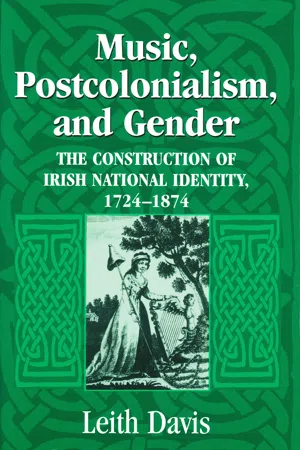
Music, Postcolonialism, and Gender
The Construction of Irish National Identity, 1724–1874
- English
- PDF
- Available on iOS & Android
Music, Postcolonialism, and Gender
The Construction of Irish National Identity, 1724–1874
About this book
In Music, Postcolonialism, and Gender, Leith Davis studies the construction of Irish national identity from the early eighteenth until the mid-nineteenth centuries, focusing in particular on how texts concerning Irish music, as well as the social settings within which those texts emerged, contributed to the imagining of Ireland as "the Land of Song." Through her considerations of Irish music collections by the Neals, Edward Bunting, and George Petrie; antiquarian tracts and translations by Joseph Cooper Walker, Charlotte Brooke, and James Hardiman; and lyrics and literary works by Sidney Owenson, Thomas Moore, Samuel Lover, and Dion Boucicault, Davis suggests that music served as an ideal means through which to address the ambiguous and ever-changing terms of the colonial relationship between Ireland and England.
Davis also explores the gender issues so closely related to the discourses on both music and national identity during the time, and the influence of print culture and consumer capitalism on the representation of Irish music at home and abroad. She argues that the emergence of a mass market for culture reconfigured the gendered ambiguities already inherent in the discourses on Irish music and identity.
Davis's book will appeal to scholars within Irish studies, postcolonial studies, gender studies, print culture, new British history, eighteenth- and nineteenth-century studies, and ethnomusicology.
Frequently asked questions
- Essential is ideal for learners and professionals who enjoy exploring a wide range of subjects. Access the Essential Library with 800,000+ trusted titles and best-sellers across business, personal growth, and the humanities. Includes unlimited reading time and Standard Read Aloud voice.
- Complete: Perfect for advanced learners and researchers needing full, unrestricted access. Unlock 1.4M+ books across hundreds of subjects, including academic and specialized titles. The Complete Plan also includes advanced features like Premium Read Aloud and Research Assistant.
Please note we cannot support devices running on iOS 13 and Android 7 or earlier. Learn more about using the app.
Information
Table of contents
- Cover
- Half title
- Title page
- Copyright
- Dedication
- Contents
- Illustrations
- Acknowledgments
- Introduction
- 1. Nation and Notation
- 2. Harping on the Past
- 3. “The United Powers of Female Poesy and Music”
- 4. Sequels of Colonialism
- 5. Patriotism and “Woman’s Sentiment” in Sydney Owenson’s Hibernian Melodies and The Wild Irish Girl
- 6. A “Truly National” Project
- 7. In Moore’s Wake
- 8. Irish Music, British Culture, and the Transatlantic Experience
- Afterword
- Notes
- References
- Index